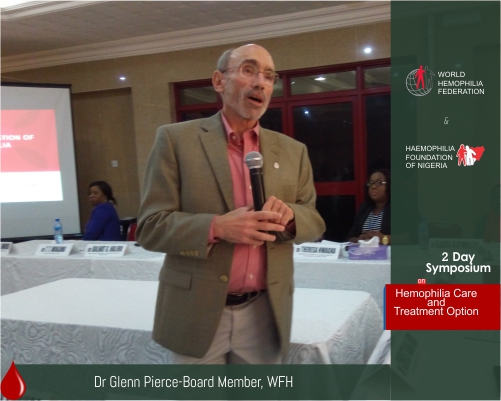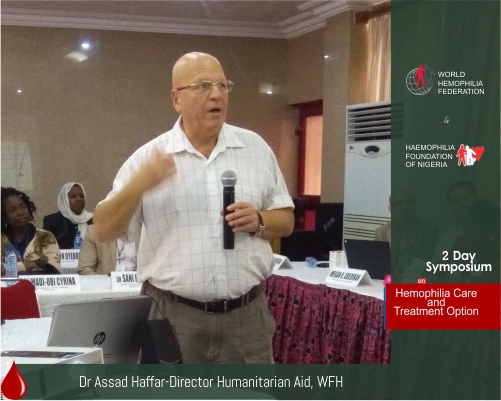Facilitators:
Dr Glenn Pierce-Board member,WFH
George Ampartzidis- Logistics specialist, WFH
Dr Assad Haffar-Director Humanitarian Aid, WFH
First session:

Dr Glenn Pierce began the second day with an overview of synovectomy and how joint replacement is done through the use of Rifampicin injected into the joints, radioactive or isotopes.
Dr Assad engaged participants on circumcision, most practices and the outcome in children with haemophilia. Majorly, concerns were raised with regards to the poor practices in carrying out circumcision in Nigeria. Noting the fact that children do not undergo a blood clotting test before circumcision, and as such may bleed to death. Participants suggested the need for a protocol which insists that a blood clotting test is conducted before such exercise. However, Professor Omolade Awodu from the University of Benin teaching hospital stressed that in rural areas, most circumcisions are done by traditional birth attendants or chemists.

Furthermore, participants suggested the need to focus on primary and secondary level of healthcare and education/capacity building of traditional birth attendants and chemists in rural areas.
The second session began with an in-depth discussion on treatment with FC fusion extended half-life CFC by Dr Glenn Pierce. He described two methods: Fusion and Pegylation as the techniques for treatment with FC.
This was followed by a lecture on logistics by Mr Ampartzidis (Logistician, WFH), who took participants through the process of online reporting to the World Federation of Hemophilia. He proposed a weekly submission of reports via the organizations reporting platform and also stressed the importance of this by all facilities. Stating that this was a way of being accountable for products received and the generation of data to improve services.
Mrs Adediran obliged participants to ensure they provide cold-boxes for each facility for easy transportation of clotting factors.
Third session:
This session involved presentation of haemophilia cases by each healthcare facility, stating the management history of the patient and further difficulties experienced (If any).
National hospital Abuja and Ogbomosho teaching hospital solicited for more support from Organizations. The representative of Ogbomosho teaching hospital emphasized the need for awareness creation and liaison of centres with clotting factor with private hospitals/ primary health centres in communities that are far from centres with factor products. She also advocated for the empowerment of women whose children have haemophilia yet dependant on their partners who may barely respond to the medical needs of their children.
Dr Bolanrinwa from Lagos state university teaching hospital mentioned the issue of psychosocial problems faced by persons with haemophilia, low adherence rate and often addiction to Opioids.
Dr Fatima Ja’afar highlighted the importance of a step-down training for nurses and other healthcare providers in all facilities by representatives at the conference.
